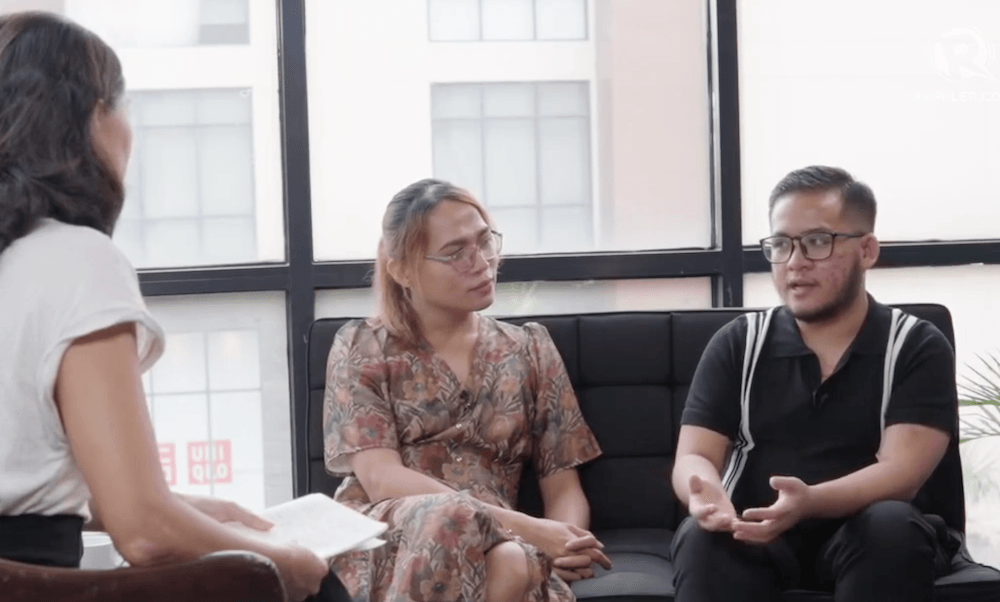Planning to medically transition? Here's advice from two transgender leaders.

Source: Rappler
Author: Pia Ranada
MANILA, Philippines - Two transgender leaders shared insights on ways to medically transition safely in the Philippines, and support transgender persons who experience discrimination, in an episode of Rappler's community show, Be the Good, aired last Friday, June 7.
Medical transitioning is when a transgender person chooses medical means to affirm their gender - including through hormone therapy or surgery. In a country like the Philippines with powerful conservative religious groups holding sway in politics and society, there is limited awareness of medical transitioning.
Society of Trans Women of the Philippines (STRAP) executive director Vashti and Transmasculine Philippines (TmPH) founder and executive director Matt Alea said that the first step is to seek medical advice from reputable transgender health organizations.
The two recommended the following groups:
The last two offer free consultations, said Alea. Approaching these groups helps ensure trans people don't overdose or take unsafe medications.
There are different types of medical transitioning. These include:
Vashti said trans women spend around P1,500 to P2,000 monthly on medications, aside from lab tests and check-ups. For trans men, hormone therapy costs about P150 to P300 monthly, but quarterly lab tests cost around P3,000. The lab tests are to ensure that the trans are healthy and getting proper dosage.
In view of the cost of maintenance, she said trans healthcare should be included in the insurance system since the country's health system should cover everyone. Trans people who are minimum wage-earners cannot afford gender-affirming medical options without help. This could lead to self-medication or turning to affordable medications or surgery that are unsafe.
"We've heard a lot who [were] not able to access healthcare and now deteriorate in terms of their health," she added.
Alea shared that top surgery for trans men, where breasts are removed and trans undergo chest masculinization, costs around P170,000 to P250,000. Bottom surgery for trans men costs about a million pesos and is not yet being done in the Philippines, so far. The nearest country where this procedure is available is Thailand.
Vashti and Alea lauded inclusive healthcare initiatives like Philippine healthcare providers who cover gender-affirming surgery.
With the Sexual Orientation, Gender Identity, Gender Expression, and Sex Characteristics (SOGIESC) Equality bill and the Comprehensive Anti-Discrimination bill (CADB) still not being passed into law, there are numerous instances of discrimination against trans people.
There are also situations when anti-discrimination ordinances in cities are in place yet people still violate them. According to Alea, discrimination can bring mental and emotional anguish to trans people. Some young transmen who seek help from Transmasculine Philippines have committed suicide because of such instances, and from rejection from loved ones.
Alea said that finding a support system helps as some trans may feel that no one can understand their problems.
Vashti shared that there are communities that trans can reach out to like STRAP and other LGBTQIA+ organizations.
"What helps me most is finding my community and making sure that I keep on sustaining that community," she said.
Being part of her own community that supports, accepts, and understands her helps build her strength and gives her a sense of belonging. Safety should also be prioritized.
"When you suffer as a trans person, you think that you deserve it because you expect it from being trans but really the answer is you don't, you don't deserve that kind of pain, you don't deserve that suffering," Alea said.
Trans should remember that even if they experience these challenges, things will get better in time and there are many trans people leading successful and happy lives.
"The suffering is not because of your transness but it's because of the people who are against it," Alea said.
For the family members and friends of trans who do not know how to support them but want to, Vashti said simply listening and accepting their trans loved one is already a big step. They can also push for inclusion of trans people in their circles.
The worst thing someone can do is to make their transgender child go through "conversion" camp or sessions.
"Our gender sexual orientation gender identity can't be corrected, [in] the same way as your sexual orientation and gender identity can't be corrected," said Vashti.
Alea also mentioned the importance of getting themselves informed as a lack of understanding leads to fear.
Despite setbacks, Vashti and Alea see small but important victories for the trans movement. For Alea, the meaning comes from knowing he and his group are able to be the trans adults who provide the support and guidance that he, as a young trans man before, had so desperately needed.
For Vashti, seeing trans people living fulfilling lives shows the movement is alive and well.
"I'm very proud that we're continually existing, resisting." - Angela Ballerda/Rappler.com
